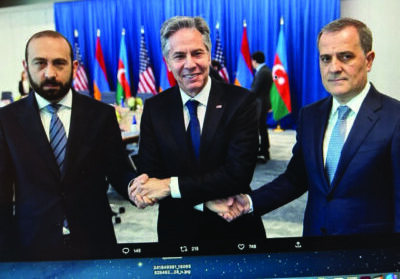WASHINGTON (Azatutyun) — Bilateral talks between the foreign ministers of Armenia and Azerbaijan in Washington will be held over the course of “a few days”, according to a senior official in the United States privy to the details of the negotiations schedule.
“Both parties have acknowledged that this is the first time that they will be able to meet over the course of a few days,” the official said. “We expect discussions throughout the week. Our goal is to make sure that the ministers are able to sit down and talk to each other.”
The first bilateral meeting between Ararat Mirzoyan, of Armenia, and Jeyhun Bayramov, of Azerbaijan, took place on Monday, May 1, and followed their separate meetings with US Secretary of State Antony Blinken as well as their trilateral meeting in Washington.
Prior to the meetings Blinken said in phone calls with the leaders of Armenia and Azerbaijan — Prime Minister Nikol Pashinyan and President Ilham Aliyev — that the United States remained committed to supporting the peace efforts of the two countries.
The official at the State Department said that the Washington talks between Mirzoyan and Bayramov were focused on trying to hammer out an agreement on “normalization of relations.”
“It is for both parties to normalize their relations to be able to live together […], to strengthen their economic ties and perhaps even to reinforce their collective security in the region,” he said, adding that all issues, including issues of how ethnic minorities are treated in both countries in terms of their rights and security, are “being discussed.”










